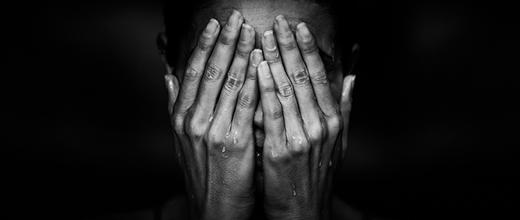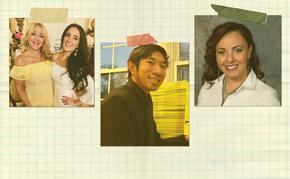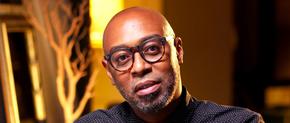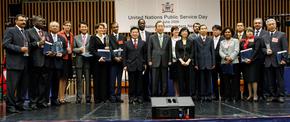The views expressed in our content reflect individual perspectives and do not represent the authoritative views of the Baha'i Faith.
Unless you live in a bubble and never read or watch the news, you’ve probably heard these words over and over: “If you’re not outraged, you’re not paying attention.”

Heather Heyer was killed during the Charlottesville protest this year.
They’re a challenge paralegal Heather Heyer issued to her friends before her murder during the riot that took place in Charlottesville, Virginia during a clash between protestors and counter-protestors in regards to the removal of a statue of Confederate General Robert E. Lee.
We all have opinions. Our heads are not buried in the ground, although many of us act as though that’s where we’ve placed them. Some of us don’t give voice to our opinions for fear of causing controversy, in the mistaken belief that this will preserve the peace. “Never discuss religion or politics,” is the adage we hear—but—when adhered to, it actually allows emotions to smolder, fester and ultimately erupt. Whether individual feelings or those of groups, these powerful emotions will eventually reach their breaking point.
The best way to avoid an eruption—which can be quantum leaps worse than letting ourselves be heard and in turn listening to why those who differ believe the way they do—is to come to a consensus, whether it be to “agree to disagree” or to work out some kind of compromise.
The Baha’i teachings explain that we should:
… take counsel together in such wise that no occasion for ill-feeling or discord may arise. This can be attained when every member expresseth with absolute freedom his own opinion and setteth forth his argument. Should anyone oppose, he must on no account feel hurt for not until matters are fully discussed can the right way be revealed. The shining spark of truth cometh forth only after the clash of differing opinions. – Selections from the Writings of Abdu’l-Baha, p. 87.
Our moral obligation as citizens, as human beings, is to stand up for our beliefs and to protect and defend others from unfair and unjust actions. We can only do this by making our voices heard and by petitioning authorities, using any and all peaceful means.
Baha’u’llah asks us to:
Be as a lamp unto them that walk in darkness, a joy to the sorrowful, a sea for the thirsty, a haven for the distressed, an upholder and defender of the victim of oppression. – Gleanings from the Writings of Baha’u’llah, p. 285.
But he does not tell us that in opposing injustice, bigotry or hatred we should do so in a state of wrath or violent reaction. He instead wants us to be “… a guiding light unto the feet of the erring.” – Ibid.
If we react in anger we cannot encourage change in others. Worse, we may cause them to become even more entrenched in their thinking, spurring them on to further hateful or violent acts. So we stand up for and demand justice, but we do so lovingly and peacefully. We cannot right a wrong by committing another wrong.
That is not to say that acts that are unlawful or unjust should be ignored. This is why we have a justice system. Even if someone’s actions lead us to wish for revenge, we must avoid it completely. Abdu’l-Baha explained:
Now, vengeance is reprehensible even according to reason, for it is of no benefit to the avenger. If a man strikes another, and the victim chooses to exact revenge by returning the blow, what advantage will he gain? Will this be a balm to his wound or a remedy for his pain? No, God forbid! In truth the two actions are the same: Both are injuries, the only difference is that one preceded the other. Therefore, if the victim forgives, or better yet, if he acts in the opposite manner, this is praiseworthy.
As for the body politic, it punishes the aggressor but not to exact revenge. The purpose of the punishment, rather, is to deter and dissuade, and to oppose iniquity and aggression, so as to prevent others from extending their hand likewise in oppression. – Some Answered Questions, newly revised edition, pp. 307-308.
May the legacy of Heather Heyer and her untimely death enhance our own awareness and commitment to stand up for justice and to spread the light of oneness of humanity—to be loving and to create peace.
That brave young woman was nervous about participating in the counter-rally because she feared the violence she believed would erupt. Ms. Heyer’s co-worker, Victoria Jackson, recalled her admitting, “I want to go so badly but I don’t want to get shot. I don’t want to die…” Yet she went—and she died. Is that a negative or a positive? I’d say both. As her mother, Susan Bro, expressed to those attending her daughter’s funeral, referring to the people who organized and participated in the white supremacist rally, “They tried to kill my child to shut her up, but guess what, you just magnified her.” Her father Mark Heyer said, “We need to start with forgiveness and stop all of the hate.”
Let’s each of us vow to do so as well. Let’s not allow Heather Heyer to die in vain.
You May Also Like
Comments

















The next step might be to talk about what is going on in the rest of the world. I would particularly ...like to know what our response should be to the people of the Democratic Republic of the Congo being raped and slaughtered in the millions.
www.bahai.org/frontiers/